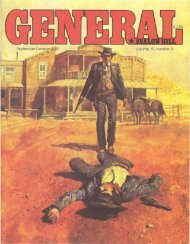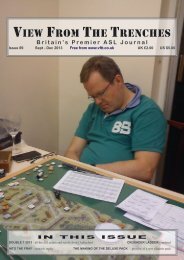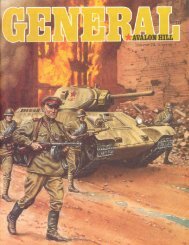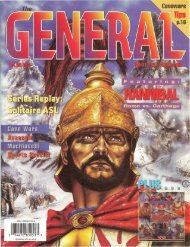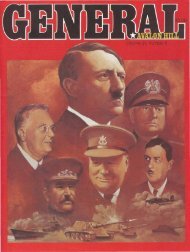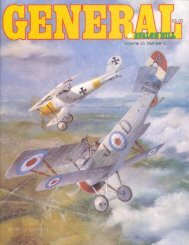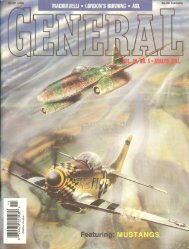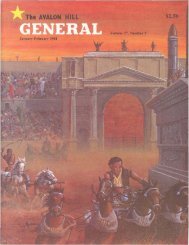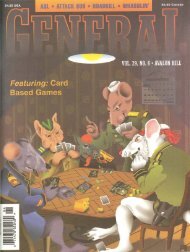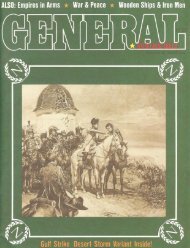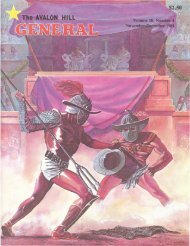Create successful ePaper yourself
Turn your PDF publications into a flip-book with our unique Google optimized e-Paper software.
16<br />
<strong>The</strong> Empire<br />
To be the Emperor is to be given some very great advantages, but one also<br />
acquires a rather subtle disadvantage. <strong>The</strong> Emperor is one of the most<br />
powerful teams in the game, and it is power he acquires early (unlike the<br />
Guild or the Fremen), this makes him the front-runner. Although a skillful<br />
Emperor can force an early victory, in most cases he will suffer the fates ofall<br />
front-runners and attract an immense amount of opposition. An Imperial<br />
player must remember this when playing, a little subtlety will allow him to<br />
use that excellent English ploy of "Divide and Rule".<br />
His advantages are, indeed, great. <strong>The</strong> Imperial player can often be a<br />
novice and still survive despite his mistakes (unlike the Harkonnen or<br />
Atreides, for example) as his shield tells him he has the power ofgreat wealth.<br />
Receiving the spice from the bidding rounds is indeed a rich harvest. It<br />
should be remembered, however, that the Imperial incomes are distinctly<br />
cyclical. Early turns will see most players bidding heavily, but this will begin<br />
to give way in the later moves. Further a sense of keen competition in the bidding<br />
rounds can give way to a 'ring' as the other players decide to keep the<br />
price low. Fortunately for the Imperial Chancellor such agreements require<br />
more long-term thought than most gamers can supply-the possibilities for<br />
crime being considerable.<br />
Although his wealth rivals that of the Guild the Emperor is not nearly as<br />
weak as them. In his army of Sardaukar he has a mighty force, obliging his<br />
enemies to use their best leaders in every combat (when who knows what<br />
unpleasantness might strike them down?). True, the Imperial forces are all<br />
off-planet, and their landing will oblige the Emperor to hand a slice of his<br />
wealth over to the Guild, but the Emperor possesses the power ofsudden vertical<br />
envelopment with crushing power.<br />
<strong>The</strong> Emperor, like all tyrants, does lack a powerful group of leaders.<br />
Fenring and Aramsham hardly inspire one with terror, and if it was not for<br />
the Sardaukar and all that spice one might be able to snap one's fingers at the<br />
Padi hah Emperor. <strong>The</strong> worry of having Fenring as a traitor is made worse<br />
by the low revival rate among the army in general and the Sardaukar in particular.<br />
True, a free revival rate of one a turn is not world-shattering, but<br />
with money all may be accomplished. <strong>The</strong> elite corps of Sardaukars,<br />
however, pose a different problem. A victory that costs heavily in Sardaukar<br />
lives may leave the Emperor open to counter-stroke and allow another player<br />
to take advantage. Like the Imperial Guard of Napoleon, one reserves one's<br />
elite forces for the final battle.<br />
That having been said the Imperial position is not difficult to play. You<br />
have only to avoid being spotted early in the game and then use your immense<br />
advantages to smash smaller people into many pieces. Further, I do not really<br />
think the Emperor is a position for the more cunning player-he will find his<br />
powers too obvious. This is not to say that winning is easy, but when you are<br />
militarily powerful, possessed of many treachery cards, and wealthy you do<br />
not find yourself grubbing for spice in the desert! <strong>The</strong> Emperor, like<br />
Napoleon, is a mere pounder, but a damned efficient pounder at the same<br />
time.<br />
House Corrino<br />
<strong>The</strong> Emperor is by far the character which is most fun to play ifyou are at<br />
all given to swaggering. His virtually inexhaustible wealth is a constant thorn<br />
in the side of the other players who tend to be on the verge of bankruptcy aU<br />
the time. It is also the best character to give to a new player unfamiliar with<br />
the game. It is easy and fun to play, its position can't be devastated early in<br />
the game, and its strategies do not require the subtlety of the other pieces,<br />
giving a chance to learn the depth of the game while not feeling too bumbling<br />
about it.<br />
<strong>The</strong> emperor's leaders are strong, his wealth allows him to make large<br />
shipments anywhere on the planet, and his generally full hand of cards buys<br />
him respect in any battle situation.<br />
As Emperor, however, you will have your limits, too. If you want to fill<br />
your hand and buy all the treachery cards you can the first turn, you probably<br />
won't have the spice to ship with, and on the second turn the others will<br />
be able to buy cards cheaply since you are not in the market, and you won't<br />
have much ofan income. If you choose to wait on buying cards, you can ship<br />
on a large force but may not be able to protect it well.<br />
At the start of the game Paul and the Baron will have the cities well fortified,<br />
so you are probably wise to ship onto a sietch. But this, of course,<br />
gives you a very limited mobility with those troops, and you may see them sit<br />
there the whole game. At some point you will be forced to fight for a city if<br />
you want to be as strong on the board as you are off it.<br />
Your reliance on shipping and poor mobility once on Dune will generally<br />
mean you have a mass oftroops in one territory. This is a dangerous situation<br />
if you don't know the capabilities of your opponents. Hordes of imperial<br />
troops seem to attract death missions by players out to prove their mettle,<br />
and you may well have to defend your position with a leader you can't fully<br />
trust, or not knowing if you are up against a Lasegun/Shield suicide squad.<br />
Even victory in such a battle is often pyrrhic, having dialed high against any<br />
contingency.<br />
Since your only real advantage is economic, it is best to play that to the<br />
hilt. Al ways buy up to your full limit of troops from the tanks, to keep your<br />
reserve potential strong. You also want to keep spice out of the hands of any<br />
strong player, to maximize your position relative to his. This means you may<br />
want to actually head for a spice blow if you think he will too, to make him<br />
pay dearly for the right to harvest it. Generally you want to see battles, death,<br />
and destruction divide and impoverish your subjects, taxing what spice they<br />
have just to ship back on the same tokens that were lost.<br />
Your biggest strategic problem, however, is the democratic four-card<br />
limit. You will have no trouble achieving a full hand, but once you have it<br />
and can no longer bid, your wealth loses its importance. A clever Emperor<br />
will quickly recognize this and actively play so as to reduce his hand and stay<br />
in the bidding every turn. This will mean getting into minor skirmishes on<br />
almost every turn to dispose of worthless cards, cheap heros, and even<br />
duplicate weapons or defenses. It will also mean an activist position with



